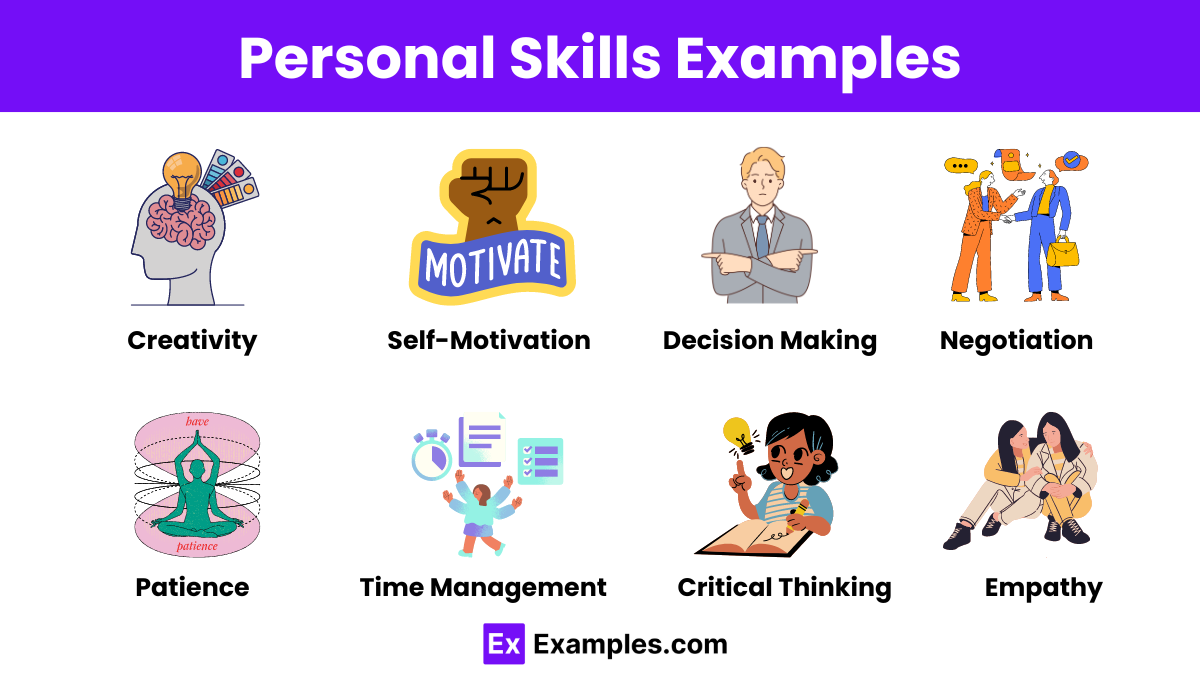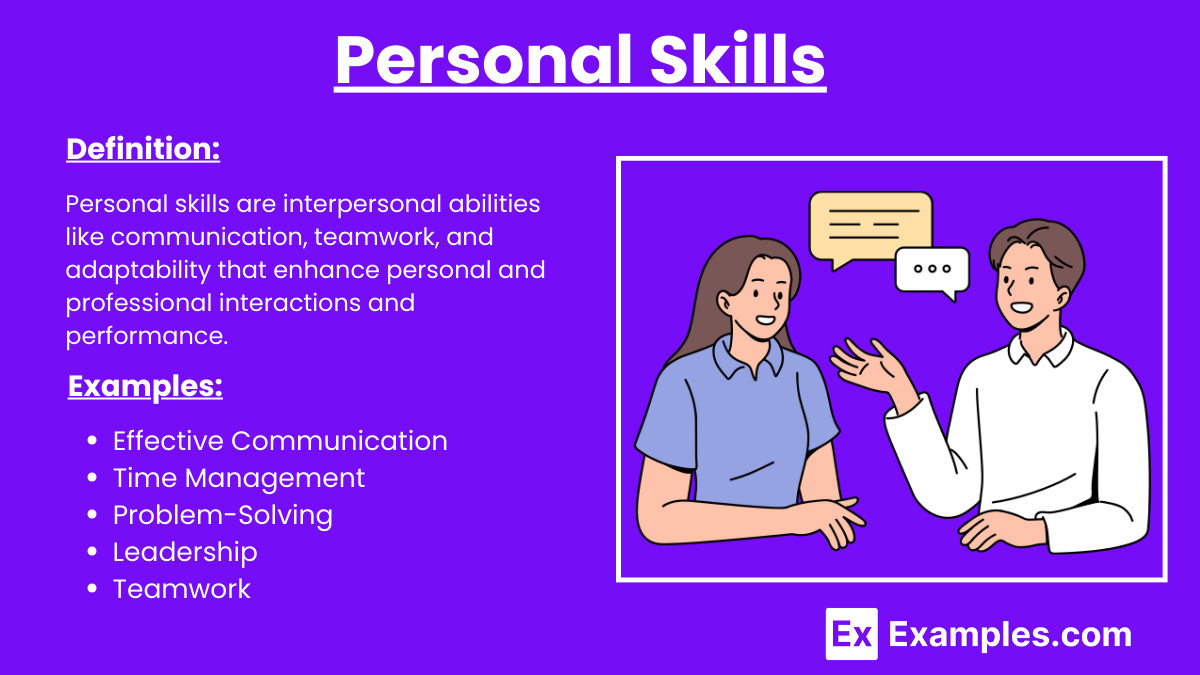20+ Personal Skills Examples
Personal skills are essential abilities that enhance an individual’s personal profile and contribute to personal and professional success. These skills include effective communication, time management, problem-solving, adaptability, and emotional intelligence. They enable individuals to navigate social interactions, overcome challenges, and achieve goals efficiently. Developing strong personal skills not only improves self-awareness and interpersonal relationships but also enhances career prospects and overall quality of life. Cultivating these skills is vital for personal growth and professional development.
What are Personal Skills?
Personal skills are abilities that enhance an individual’s interactions and performance in various aspects of life. These skills include communication, time management, problem-solving, adaptability, and emotional intelligence, helping individuals effectively navigate social situations, achieve goals, and improve personal and professional relationships.
Personal Skills Examples

- Effective Communication
- Time Management
- Problem-Solving
- Adaptability
- Emotional Intelligence
- Leadership
- Teamwork
- Critical Thinking
- Conflict Resolution
- Creativity
- Interpersonal Skills
- Self-Motivation
- Decision Making
- Stress Management
- Organizational Skills
- Active Listening
- Negotiation
- Patience
- Empathy
Personal Skills Examples for Students
- Self-Discipline – Maintaining focus and adhering to study schedules independently enhances communication skills for students by fostering self-discipline and effective time management.
- Goal Setting – Establishing and striving to achieve both short-term and long-term academic objectives while utilizing interpersonal skills for effective collaboration and support..
- Curiosity – Demonstrating a strong desire to learn and explore new subjects and ideas.
- Resilience – Overcoming setbacks and persisting in the face of academic challenges.
- Note-Taking – Effectively capturing and organizing information from lectures and readings.
- Public Speaking – Confidently presenting ideas and information in front of classmates and teachers.
Personal Skills for Work
- Effective Communication – Clearly conveying information and actively listening.
- Time Management – Prioritizing tasks and meeting deadlines efficiently.
- Problem-Solving – Identifying issues and developing practical solutions.
- Adaptability – Adjusting to changing work environments and roles.
- Teamwork – Collaborating effectively with colleagues and contributing to team goals.
- Leadership – Inspiring and guiding others towards achieving objectives.
- Critical Thinking – Analyzing situations and using skills to make informed decisions.
- Conflict Resolution – Managing and resolving workplace disputes amicably.
- Organizational Skills – Keeping workspaces and tasks well-ordered.
- Emotional Intelligence – Understanding and managing your emotions and those of others.
Personal Skills for Resume
- Leadership – Experienced in guiding projects and motivating team members to achieve success, enhancing my personal profile in leadership and team management.
- Critical Thinking – Strong analytical skills for evaluating situations and making informed decisions.
- Organizational Skills – Highly organized with an ability to manage multiple tasks efficiently.
- Conflict Resolution – Skilled in mediating and resolving disputes to maintain a harmonious work environment.
- Emotional Intelligence – Proficient in understanding and managing emotions to foster positive workplace relationships.
Best Personal Skills
- Empathy – Understanding and sharing the feelings of others to build stronger connections.
- Creativity – Thinking outside the box to generate innovative ideas and solutions.
- Attention to Detail – Carefully reviewing tasks to ensure accuracy and quality involves applying active listening in communication skills to understand and execute requirements precisely.
- Resilience – Bouncing back from setbacks and staying motivated.
- Networking – Building and maintaining professional relationships for career growth.
- Self-Motivation – Taking initiative and driving personal development.
- Cultural Awareness – Respecting and understanding diverse backgrounds and perspectives.
Why Personal Skills are Important?
- Enhance Communication – Effective personal skills, including soft communication skills, improve the ability to convey ideas clearly and listen actively, leading to better understanding and collaboration..
- Boost Productivity – Skills like time management and organization help in prioritizing tasks and completing them efficiently.
- Improve Problem-Solving – Strong problem-solving abilities enable individuals to tackle challenges effectively and find practical solutions.
- Foster Relationships – Personal skills such as empathy and teamwork build stronger connections with others, enhancing both personal and professional relationships.
- Adapt to Change – Adaptability and resilience help individuals navigate and thrive in changing environments and situations.
- Promote Career Growth – Skills like leadership, creativity, and networking are crucial for personal development and advancing in one’s career.
Tips to Improve Your Personal Skills
- Practice Active Listening – Pay close attention to what others are saying without interrupting, and respond thoughtfully.
- Set Goals – Establish clear, achievable goals for skill development and track your progress regularly.
- Seek Feedback – Ask for constructive feedback from peers, mentors, and supervisors to identify areas for improvement.
- Stay Organized – Use tools like planners, to-do lists, and digital apps to manage tasks and time effectively.
- Engage in Continuous Learning – Take courses, attend workshops, and read books related to personal skills development.
- Network Regularly – Build and maintain professional relationships through networking events and social platforms.
- Practice Empathy – Make an effort to understand others’ perspectives and emotions to build stronger connections.
- Stay Positive – Maintain a positive attitude and stay motivated even when faced with challenges.
- Improve Public Speaking – Join clubs like Toastmasters or practice speaking in front of friends to boost your confidence.
- Embrace Adaptability – Be open to change and willing to adjust your approach as needed to overcome obstacles.
How to Highlight Personal Skills
- Tailor Your Resume – Customize your resume to include specific personal skills relevant to the job you are applying for, using keywords from the job description.
- Use Examples in Cover Letters – Provide concrete examples of how your personal skills have contributed to past successes in your cover letter.
- Showcase in Interviews – During interviews, highlight your personal skills by discussing real-life scenarios where you effectively utilized them.
- Seek Endorsements – Ask colleagues, supervisors, or mentors to endorse your personal skills on professional networking sites like LinkedIn.
- Include in Performance Reviews – Regularly document and communicate your personal skills and their impact in performance reviews or self-assessments at work.
Differences Between Hard Skills and Soft Skills
| Aspect | Hard Skills | Soft Skills |
|---|---|---|
| Definition | Specific, teachable abilities or knowledge. | Interpersonal attributes and personal traits. |
| Examples | Programming, accounting, data analysis. | Communication, teamwork, problem-solving. |
| Measurement | Easily measurable with tests or assessments. | Harder to measure; often observed in behavior. |
| Training | Typically learned through formal education or training programs. | Often developed through experience and practice. |
| Application | Applied to specific tasks and technical aspects of a job. | Applied to interactions and managing relationships. |
| Relevance | Essential for completing job-specific duties. | Crucial for workplace harmony and leadership. |
Why are personal skills important?
They enhance communication, productivity, and relationships, contributing to personal and professional success.
How can I improve my personal skills?
Practice, seek feedback, and engage in continuous learning and self-reflection.
What is an example of a personal skill?
Effective communication is a common personal skill.
Can personal skills be learned?
Yes, personal skills can be developed through practice and experience.
How do personal skills differ from hard skills?
Personal skills are interpersonal and behavioral traits, while hard skills are specific, teachable abilities.
Why are personal skills important in the workplace?
They facilitate teamwork, problem-solving, and efficient communication, improving overall work performance.
What is emotional intelligence?
Emotional intelligence is the ability to understand and manage your own and others’ emotions.
How do I showcase personal skills on my resume?
Include specific examples and achievements that demonstrate your personal skills.
What are some top personal skills employers look for?
Communication, teamwork, adaptability, problem-solving, and leadership.
Can personal skills impact career advancement?
Yes, strong personal skills can lead to better job performance and career growth.



